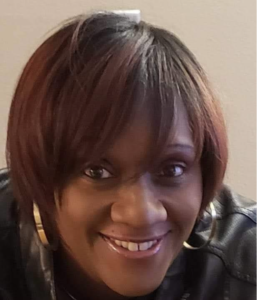My Thoughts on Black History Month as a Black Woman
Angela Hicks, Small Metro Field Coordinator, WCC Community Health Program

So, you decided to celebrate us; joy does not come from within. You are either my foe or my friend.
So, we have the shortest month to celebrate; should we jump up and down and cheer?
Where should the celebration start to make the struggle of Black people clear?
I do not like the term “Black History Month;” it does nothing for me but reminds me that it is one of the shortest months of the year.
Which does not stop racism and all the other injustices that we fear.
Now, I remind you I am offering my experience and my thoughts as a Black Woman.
You might say, I am not ready for change. Oh Lord, I feel it coming.
One definition of the word black, according to the dictionary as an adjective, is that it is of the very darkest color owing to the absence of or complete absorption of light, the opposite of white.
The dictionary defines history as a noun: It studies past events, particularly in human affairs.
What does the Bible say about Black people? During my research, I only produced the answer: the Bible does not identify any person as being black-skinned or white-skinned.
Here is my take on how the word black harms our culture:
Black sheep, black cloud, blacklisted, black hole, black magic, black Monday, blackballed, blackmail, black mark, and so forth.
If my memory serves me right, here is a compact list of words that share a positive light for Black people.
Black love, power, beauty, and, of course, when I was six, I remember singing The Father of Soul, James Brown’s most significant hit, “Say it loud, I am Black, and I am proud”—very few positive usages.
Here is a part of Black history that today’s world would like us to forget: slavery. The definition of slavery is the practice of forced labor and restricted liberty.
Here is my question. Should we forget about it, or should we use it as a conversation and communication to share with others about how dark of a place it was for Black people? We want respect and understanding. We are not looking for payback.
Here is one of the critical historical moments for Blacks: The Civil Rights Act of 1964, a landmark civil rights and labor law in the United States that outlaws discrimination based on race, color, religion, sex, and national origin.
In January 1863, Lincoln’s Emancipation Proclamation freed the enslaved in Confederate-held territory only. Black men were officially admitted to serve in the Union Army, and the United States Colored Troops were organized. There is a lot more history concerning that.
This is why I do not understand why people are trying to take away Black history; I am telling you, this is quite a mystery.
They want to take education on Black history out of the classroom and take away the books.
Just so once again, the truth of our history can be overlooked.
I want to mention some people who stood up for our rights and led many Black people into a historical fight.
Thank you, Martin Luther King Jr. and Coretta Scott King; thank you, Malcolm X; thank you, John Lewis; thank you, Rosa Parks; thank you, Freedom Riders, and so many others. I cannot give you all the history of Black people in one month, let alone in one article.
Let us not call February Black History Month; it is the month we celebrate and discuss Black History until March 1 begins.
That is not a celebration; that is pure sin, and the reality of life starts back up again. You still have Black-on-Black crime, Black-on-White crime, Black poverty, black hunger, no housing for black people, black brutality, and so on.
You may say, “Where is the bright side to all of this”? Black people were able to exercise their right to vote during Barack Obama’s two-term term as President of the United States. Whether they voted for him or not, they could cast their vote. Vote, Vote, Vote. Well, people, let us say celebrate, not hate.
Here is my closing: as a Black woman of God, I am not looking to take away the table; I am looking to sit at the table, so when you are discussing Black people, their history is not swept under the table.
It is a start, but let us not forget about our part. Black History Month should be Black History forever to remind everyone about our struggles on so many levels. My comments will soon be history, in the past.


